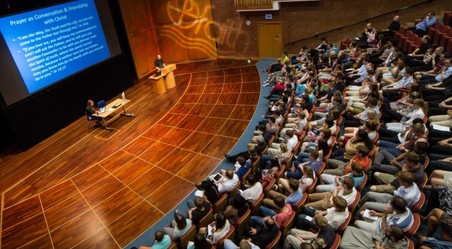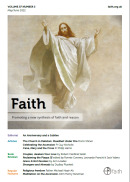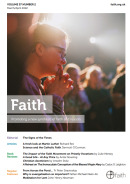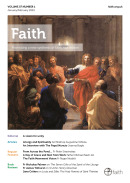Featured
Enforcement, silencing, and truth
2019 has not, thus far, been a joyful year for Britain. Knife crime – numbers of young people stabbing one another on the streets of our cities – has risen steadily and looks set to continue to do so. Political life has been chaotic, giving a general sense of uncertainty and confusion over the one thing of which we have long been confident – the resilience and reasonable competence of our system of governance. And the sinister political-correctness which over the past few years has increasingly sought control over our lives continues to grow in strength and in nastiness.
A journey from atheism
Philip Vander Elst describes how CS Lewis enabled him to grasp some liberating truths
Celibacy and The Pan- Amazon Synod

Debates about clerical celibacy are nothing new. There have been many arguments and challenges over the centuries. It is commonly asserted that celibacy is a “medieval” innovation, imposed on Catholic priests only a thousand years ago. In fact, scholarly studies have demonstrated that, in essence, it can be traced back to apostolic times.
The Luminous Mysteries – meditations
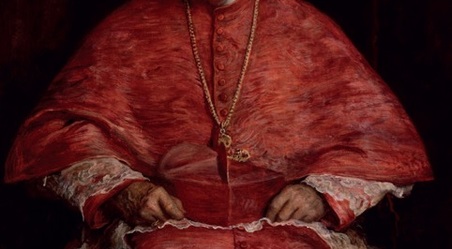
We continue our series of meditations, drawn from the works of Blessed John Henry Newman, on the Mysteries of the Rosary. These meditations have been collected together by a Sister of the Benedictine Abbey of St Cecilia on the Isle of Wight.
Pilgrimage
Interview A garden, a book – and a lot of hard work
Holloway on… Conscience and the Natural Law
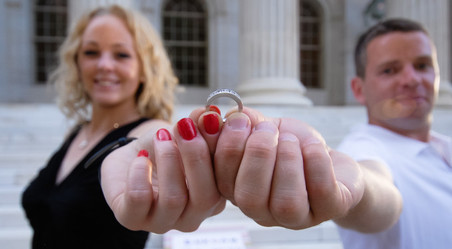
Book Review: How the early Christians venerated Mary
Book Review: Pope Benedict wanted us to look on the face of Christ
Book Review: Pope Benedict wanted us to look on the face of Christ
Suffering - why me?
Suffering - why me?
God’s existence can be rationally demonstrated
-
Enforcement, silencing, and truth
2019 has not, thus far, been a joyful year for Britain. Knife crime – numbers of young people stabbing one another on the streets of our cities – has risen steadily and looks set to continue to do so. Political life has been chaotic, giving a general sense of uncertainty and confusion over the one thing of which we have long been confident – the resilience and reasonable competence of our system of governance. And the sinister political-correctness which over the past few years has increasingly sought control over our lives continues to grow in strength and in nastiness.FAITH magazine, founded in the 1970s, has long voiced ideas that go against the tide of fashionable thought in Britain: on the possibility of doctrinal certainty in the Church, on marriage, on the truth of the Gospel. We have perhaps rather prided ourselves on this: it can be rather satisfying to affirm certainties and ride against the culture at a time when that culture is concentrating on questioning itself and announcing the impossibility of establishing fundamental truths. The message of the general culture in the era when FAITH magazine first appeared could be summed up in the notion that “there is no absolute truth – there is only my truth and your truth”, with an increasing emphasis on the “my”.ClamourThat egocentric clamour has not diminished in the decades of our magazine’s existence and it has intensified in all sorts of obvious ways. It is now standard to affirm that “choice” is paramount – from consumer pressure for an ever-expanding range of goods in supermarkets, through to the notion that a child in the womb can be destroyed at will.But something that we took for granted in the 1970s is fast disappearing: our sense of confidence in our right to challenge the culture and to discuss and analyse trends and ideas. Today, a major philosopher can be sacked from a public position assisting with housing reform because a magazine denounces him – inaccurately – for holding views it deems unacceptable. A police force subjects its members to harangues about the need to affirm the normality of believing that men can “transition” to being women and vice versa. Money extracted from us all in taxes funds lobby groups enforcing the notion that marriage between members of the same sex is an idea that must never be challenged.The expression “political correctness”, while useful as a general description of these things, fails to do justice to the fundamental wrong that is being done to our freedom to debate and discuss important matters - and to our duty to do so, as intelligent beings with minds and souls.The desire to enforce homogenous certainty seems intrinsic to humanity: while we relish debate and recognise, at a deep level, its necessity in the search for truth, we also relish power. The Church has not always got this right at a practical level: over time, she came to grasp that punishing or even killing heretics does not destroy heresy – indeed it can help it to flourish. Truth has its own power to triumph and Christ taught us this.In today’s uncomfortable Britain, are we allowed the freedom to debate, discuss and affirm truth? The 1960s and 70s seem rather distant now. When was the last time some one in public life made that formerly rather over-used statement “I disagree entirely with what you say, but I defend absolutely your right to say it”? In fact, that statement was never really true: we do not, and should not, have an absolute right to say whatever we like regardless of the harm it can do. There are, and must be, laws in any civilised society against that. There must be some protection against libel and slander. There is also a reasonable right to privacy – a doctor does not have the right to publicise my medical record, nor my bank the details of my finances. And there are legitimate restrictions on public revelation of information relating to public security, national defence interests, and more.But where does the current obsession with “hate speech” fit into all this? There is no reason whatever to ban a discussion about whether or not it is possible to “transition” from one sex to another: it is a legitimate area of medical discussion, centred on biological facts. Recent months have seen some sinister attempts to crush ordinary discussion about human realities – a mother who wrote about the wrongfulness of deliberately mutilating a child to facilitate such “transition” was denounced to the police and received a visit from them with the threat of arrest. A teacher faced dismissal for greeting a group of girls as girls – one them had decided she wanted to be addressed as a boy.HistoricalCatholics in Britain, with a deep historical memory of savage persecution, have a particular contribution to make concerning freedom of speech. Even after the horror of torture and public execution for the crime of being a Catholic priest was finally over, Catholics faced violence and danger, from the Gordon Riots at the end of the 18th century to the “No popery” gatherings in the middle years of the 19th.We have something of huge importance to offer today’s bleak Britain. Especially on matters concerning the truth about the human person, about men and women and the bond between them, about human life and human loving, about marriage and family, about faithfulness and dignity and kindliness and patience and caring for the gravely ill and the unwanted, the Church is a voice that cries out to be heard.Because of this, FAITH magazine will not bend to fashionable opinions today just as it did not in its early years. We are rather proud of our record: a reputation for “speaking out” with a voice of truth and charity is something to honour. The current Editor is conscious of inheriting a rich tradition. That this is now coupled with fears that previous editors did not have to face – including the possibility of being denounced to the police for affirming truths that are age-old and rooted in our common humanity – is mildly worrying but will not deter this Editor from doing what is right.ValourA powerful image for 2019 emerged this spring: the golden Cross, unscathed, standing firm the badly damaged Cathedral of Notre Dame. In a secularised Europe, the sight and sound of young men and women praying, kneeling, on the streets of Paris, stirred hearts. The Rose Windows of that great church survived the flames to proclaim truth in glorious beauty to fresh generations. The Blessed Sacrament was rescued thanks to the valour of a priest. We join with men and women of all faiths and none in seeing a profound symbolism in all of this, concerning the resilience of goodness, truth and beauty.It is the image, again and again, of the strangeness of Christ and the unlikeliness of everything connected with the spread of his message, in every era. It is miracles, and Cross and Resurrection, and trusting and holding up and carrying on, and mission and martyrdom and glory and grace. “Courage! It is I. Do not be afraid!”Magna est veritas et praevalebit.

